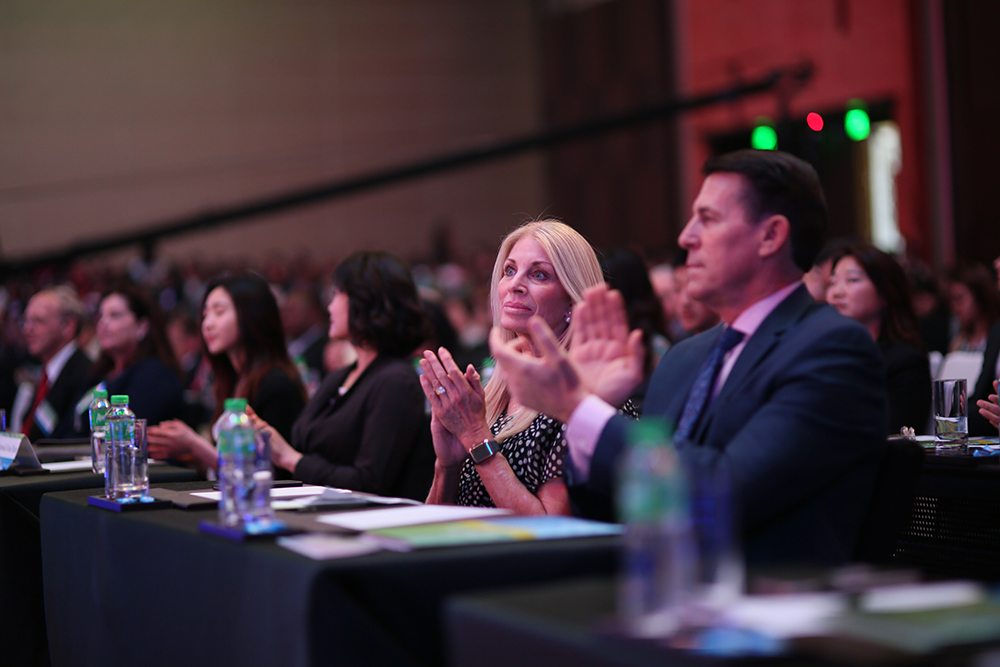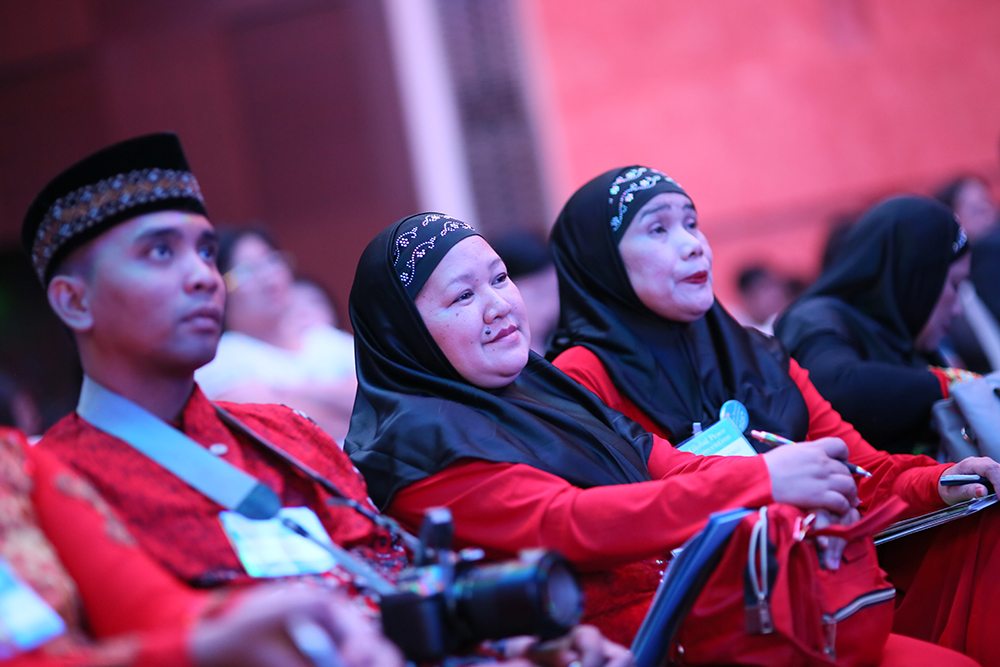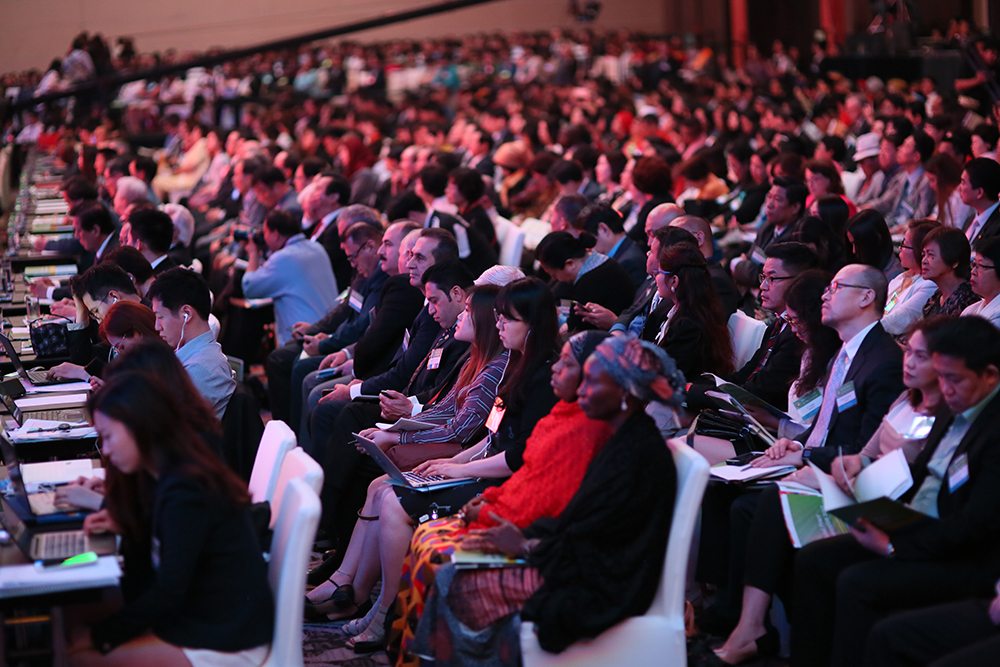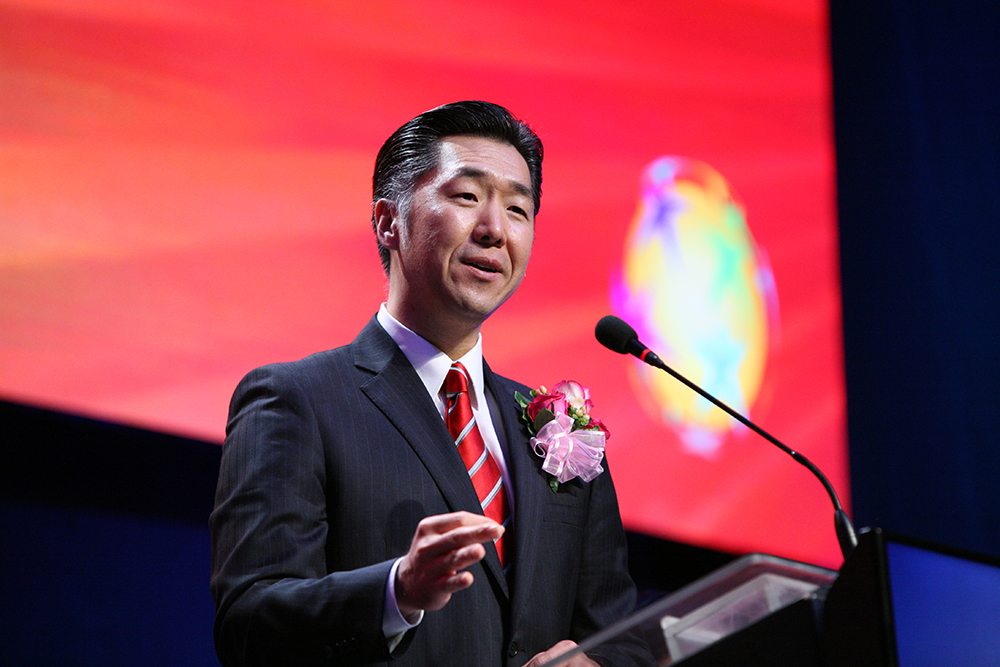The following is the full transcript of the keynote speech delivered by Dr. Hyun Jin Preston Moon, chairman of the Global Peace Foundation, at the 2017 Global Peace Convention opening plenary in the Manila Marriott Convention Center & Hotel.
Excellencies, distinguished guests, ladies and gentlemen:
It is my great honor and privilege to welcome you to this seventh Global Peace Convention here in Manila, Philippines. This Convention is bringing together leaders from more than 40 nations. They make up all sectors of society, including politicians and government officials, religious and business leaders, educators as well as civil society and youth leaders. What is exciting is that they are coming together based upon a common vision for peace and prosperity, and ready to work together to achieve it.
Many thanks to former President Gloria Arroyo of the Philippines and former President Vinicio Cerezo of Guatemala for co-chairing the international advisory committee in addition to the collaboration and support of so many partners and agencies both internationally and here in the Philippines. I would like to thank my good friend Dr. Edwin Feulner, founder of the prestigious Heritage Foundation in Washington DC, for championing the cause of liberty and the vibrant US-Asian alliance.
I would like to acknowledge from my homeland of Korea, the Honorable Jin Pyo Kim, distinguished member of the Korean National Assembly and former Deputy Prime Minister, and the Honorable Hwa Gahp Han, a statesman and former Chairman of the New Millennium Democratic Party of the Republic of Korea.
I would also like to recognize the members of GPF’s Global Leadership Council from around the world listed in the program. And special thanks to our many convention sponsors and partners here including the Philippines Department of Education, the Commission on Higher Education, the Tourism Promotions Board, the Chamber of Commerce of the Philippine Islands, SM Cares, and all of our media partners, along with the many global partners including IBM, One Korea Foundation, United Nations ESCAP, and many others listed in your convention program.

Dr. Robert A. Schuller and Donna Schuller applauding
We are convening this historic 7th Global Peace Convention here in Manila, returning to the Philippines – the site of our first Convention in 2009 – for important reasons. As I mentioned more than a decade ago, the Asian continent and the Pacific Island nations are increasingly becoming the center of global influence, economic opportunity and dynamism. Clearly the global center is shifting from the Atlantic sphere, as we are entering what can be called the pan-Pacific Rim era. As a rising Southeast Asian nation with unique geographic, cultural and historic connections, the Philippines is ideally positioned to play an important role for peace in this region and the world.
Throughout past Global Peace Conventions, a reoccurring theme I emphasized was the importance of the southern hemisphere in determining the future of this century. I noted the potential of guiding their emerging political and economic systems to reflect the best models that the developed world has already produced without making the same mistakes that plague those very nations today. In other words, due to their later development, they have the unique opportunity to gain from the best solutions and mitigate the failed approaches to guide their national and regional development.
The Southeast Asian block shows the greatest promise, in this regards. It is strategically situated in the most active global maritime trade zone, replete with abundant natural resources, a huge growing population of industrious people, moderate governments as well as a relatively inclusive social and religious environment. Thus, this block has the potential of being a rapidly growing region with greater global economic, political, social and religious consequences. What transpires here will affect Southeast Asia, the pan-Pacific rim, Asia proper and the rest of the world.
That is why we have come here to the Philippines again, my second home in Asia, at a time it is playing a greater role in determining the future of this region as the Chair of the 50th ASEAN convening. And most importantly, given the principles and values-based perspective of the Global Peace Convention, it is natural that we are convening here because of the God-centered, family-oriented heart of the Filipino people, as reflected in the Philippines national motto: Maka-Diyos, maka-tao, maka-kalikasan, at maka-bansa – For the love of God, people, nature and country.
Our convening here under the theme Moral and Innovative Leadership: New Models for Peace and Development is timely and relevant. A little more than a year ago, the United Nations and related international entities launched a campaign to achieve the Sustainable Development Goals by 2030. This convention is offering innovative and new sustainable models of multi-sector cooperation to the achievement of these goals. At the same time, there are even more fundamental issues that must be addressed, especially as we aspire to achieve not only laudable development aims but also genuine peace based on liberty, individual rights and just governance.
The year 2016 was certainly one of considerable turmoil, challenge and change. We are at a major inflection point in the history of our nations, and have reached a crossroads amidst changes of leadership from Asia to the Americas, and around the world. Failed top down models and the status quo are giving way to the rise of populist movements that champion the concerns of those who feel left out or overrun in rapidly changing social landscapes.
Global trends and technological advances have resulted in the closer engagement of peoples, cultures and economies. That affords us great opportunity for positive development, but also can pose significant challenges in forging cohesion amongst diverse peoples. As the world becomes “smaller” and more inter-connected, how can we build unity within the great diversity of human nationalities, ethnicities, races and religions? How can we reconcile the differences between national interest and the global good?
Any global perspective or approach based solely on political or economic considerations is inherently limited and insufficient. Globalization is being challenged because nations have not developed the ways or means to move beyond narrow self-interest. In short, no one has effectively put forth a moral and spiritual justification for a new dimension of international engagement.
What is required is a simple, clear vision that encapsulates the essence of our common humanity, grounded in universal principles that support fundamental human rights as endowed by the Creator and the spiritual and moral essence of all people. Such principles are practically applied in shared values that guide how we should live and relate with each other. Shared values are the “glue” that can bind together any level of society, whether a neighborhood, a nation, or the entire global community.
We urgently need such a unifying vision; we need to recognize the vital importance of the self-evident, transcendent truths that define our common humanity; and we need to build consensus around shared values to undergird the creation of vibrant, prosperous, ethical societies. It is precisely for this purpose that I founded the Global Peace Foundation, to promote a vision expressing our common humanity, uplifting universal principles and shared values. It is from this broad-based platform that we work to concretely demonstrate the effectiveness of this values-based approach in addressing critical issues of peace and opportunity in communities and nations around the world. That vision statement is simple and clear: that all people regardless of nationality, race, ethnicity or religion belong to One Family under God.
The universal principles that undergird our liberty and define our common humanity may be named differently in various cultures, but nonetheless express transcendent truths. In my native Korea, they are expressed in the millennia-old ethic known as “Hongik Ingan.” In India, it is expressed in the ancient Hindu ideal of “Vasudhaiva Kutumbakam.” In Africa, it is known as “Ubuntu” and, in the United States, it is expressed as self-evident truths in the American Declaration of Independence.
In an ever-shrinking world fraught with the complexities of globalization, we urgently need an expression of universal shared values. Some have called such an expression a “global ethic.” I am happy to report that at this Convention significant efforts are being made to build on and carry forward the decades-long efforts to establish a consensus on a global ethic. I want to recognize and appreciate Dr. Leonard Swidler, a distinguished scholar and one of the noted pioneers of this effort, who will be headlining our Convention’s interfaith peace-building track. This track will be launching an ongoing initiative to further advance a global ethic with counterparts from Christian, Muslim, Hindu and other diverse spiritual traditions.
Moral and Innovative Leadership
Ladies and gentlemen, vision enables us to perceive what is possible, to look beyond the way things are and to see how things could be. Yet, if that vision is not acted upon and ideals are not concretely applied and lived, they remain only as abstractions, lacking tangible form and real consequences. Thus, transformative leaders are those who embrace and internalize noble ideals and set out to create the proper precedents of how they should be manifested.
The unique framework of “moral and innovative leadership” which I first introduced at our Global Peace Convention 2010 in Nairobi, clearly and concisely encapsulates the leadership qualities needed for our time. Though innovative technologies offer enormous potential to solve many of humanity’s most difficult problems, they cannot solve the roots of conflict and corruption. Leadership that is ethical and that has integrity is essential.
A moral leader is guided by a common vision that reflects the most fundamental human aspirations, conforms to universal spiritual principles that govern human life, and is committed to advance the greater good before self-interest. Moral and innovative leadership can tap the wellspring of innate human creativity because as self-governing, responsible and ethical citizens, such leaders are best prepared to address even the most intractable social problems.
Since 2010, GPF has used this framework of moral and innovative leadership in a wide spectrum of conferences, forums, and youth leadership programs. In every context, it keeps the focus on the qualities of leadership needed to achieve our most important goals, tapping our creative potential while guided by clear ethical standards. Likewise, here at the Global Peace Convention 2017, we are examining new models for peace and development within this framework.
Korean Dream
One striking example of peace is being created here in Asia in my native home of Korea. The continuing division on the Korean peninsula, and the actions of North Korea in pursuing a belligerent nuclear agenda, are now the most urgent threat to peace and security facing Asia and the world today. Maintaining the status quo is not an option. A new approach is needed that moves beyond the outdated Cold War framework, and engages the Korean people and their neighbors in shaping their own destiny.
My book the Korean Dream, published in Korean at the end of 2014 and now with a recently released English edition, lays out a roadmap for such an approach, guiding the most significant and comprehensive effort in the world today to realize the dream of one united Korea. It is being implemented by Action for Korea United, an unprecedented alliance of more than a thousand civil society, faith-based and non-governmental organizations, under the One Korea campaign. The Global Peace Foundation is a leading partner in the AKU alliance based in South Korea and is spreading that foundation to Korean diaspora communities around the world.
This ongoing campaign for One Korea has made remarkable progress and impact. We will hear much about the approaches applied and lessons learned in Korea throughout this Convention. Here let me briefly highlight the key elements of the Korean Dream roadmap that are also highly relevant in other nations and contexts around the world.
First, shared vision based on universal principles is the essential starting point. The Korean Dream points to the historic ethic familiar to all Koreans, both from the South and the North, called Hongik Ingan. It is intrinsically linked to the Korean identity, and calls for the Korean people to fulfill a destiny of living for the benefit of all humanity. Like all nations that suffered the yoke of colonialism, post-war Korea sought to define its own unique nationalist agenda but was unfortunately sucked into the geo-politics of the Cold War. It reminds Koreans that the current divide was a foreign construct outside of the aspirations of the Korean people who wanted to create a new model nation with the fall of the Japanese empire after World War II.
Secondly, the familial institution is central to the strength of the nation. Traditional Korean culture has a profound ethos based on the extended family. Those family traditions nurture essential values and provide order, stability and continuity in human relations. Such traditions are vital to the wellbeing of all, and the health of the society at large.
Korea today is a highly developed nation, with world-class infrastructure, and high levels of material prosperity. Tragically, overemphasis on adopting western norms and external development has led to family breakdown and erosion of extended family traditions. As a direct result, Korea now has one of the world’s lowest marriage and birth rates, high rates of elderly suicide and other serious social problems. Safeguarding the institution of family is vital to the health of a nation.

Diverse audience listening intently
Thirdly, a welcoming spiritual environment is essential to building a stable secular nation. I particularly mention the unique spiritual consciousness of the Korean people that enabled them to invite and adopt all the major religious traditions from around the world as well as from within. This is remarkable in that they are a predominately a homogenous people. This consciousness evolved through Korea’s, five thousand year, history to realize its founding ideals of creating a model nation that would serve all humanity. This lofty ideal made the Korean people look to religion and faith as an important resource for gleaning fundamental truths that could guide the destiny of their nation.
Thus, religion was not separate from governance but, instead, informed it. This is especially relevant today in modern western-styled democracies that are mistakenly trying to redefine the purpose of the separation of church and state. Of course, the original purpose was to assure that there was no one state-sponsored religion, but today is interpreted as the exclusion of faith from the public square. Because human beings are essentially spiritual, and naturally seek higher meaning and truths, it is essential that religious and faith activists are included in the larger body politic of a stable, ethical nation.
Lastly, a bottom-up approach to building national identity was essential to South Korea’s rise from abject poverty after the Korean War. A key element was the “new village movement” which tapped into the self-reliant spirit and community resilience of the Korean people. Encouraging self-reliance, promoting high standards of education, and engaging citizens as owners in the vision for the nation are all aspects of strengthening the country’s human capital. Citizens working together in common cause can be a powerful force for positive change.
In that same light the dream of one united Korea is for all Koreans, and working toward that end is not only for government officials or policy experts. Thus Action for Korea United (AKU) focuses on grassroots citizen initiatives and education to engage all levels of Korean society in the cause of Korean unification. “People power” can be tapped in any nation to promote the greater good, including the use of information technology and social media to ignite the spark of freedom in repressive societies like North Korea.
Civil society organizations can serve as important catalysts for change. AKU is making a huge impact because it is a broad-based alliance of organizations that touch every level of South Korean society, as well as outreaching to North Korea and diaspora communities. Likewise, around the world today civil society groups, many of which are motivated by faith and wisdom traditions, are making significant impact on a wide range of issues.
Utilizing these key elements, the movement for One Korea is making tremendous headway on the biggest peace and security challenge facing humanity. Imagine how significant it will be when this movement resolves this tragic division and conflict on the Korean peninsula that still endures after more than 70 years. With this momentum for Korea now led by the Korean people, it is time to add the global support of people and nations around the world. And here at the Global Peace Convention 2017 in Manila, AKU and its partners are substantially launching the One K Global Campaign through the scholarly meetings here and the One K Global Peace Concert at the Mall of Asia Arena on March 2nd!
Creating synergies; making impact
The Global Peace Foundation and our many partners are working together on the most pressing issues facing the human family. Our convening here in Manila is bringing those comprehensive efforts into focus – highlighting best practices, learning from on-the-ground practitioners, and creating new synergies to empower and energize leaders in making greater ongoing impact. This Global Peace Convention features an impressive array of panels, forums and action-oriented workshops all designed to be a catalyst for the concrete work of peacebuilding on every continent. Let me summarize what we will be addressing in the coming days:
- GPF’s unique interfaith platform is being applied to effectively address identity-based conflict and extremism in hotspots in West and East Africa, to build cohesion among diverse communities, and much more.
- Major faith leaders and practitioners will be discussing peace building strategies, and important issues related with international religious freedom, as well as building a global ethical framework.
- The Korean unification track includes prominent scholars from across Northeast Asia and the US who are applying a roadmap and declaration for unification, together with the grassroots leadership network of Action for Korea United.
- The Economic and Business Track features the 2nd Global Peace Economic Forum addressing strategies to unleash ASEAN economic development potential, as well as dynamic business sessions organized in partnership with the Chamber of Commerce of the Philippine Islands.
- The Global Peace Women track includes the Women Leaders’ Summit, stimulating panels on leadership, and workshops for practical training, all under the theme of “New Women’s Leadership Culture for Peace and Development: From the Home to the World.”
- The “Transforming Education” track is organized in partnership with the Philippines Department of Education and other partners, and is convening in conjunction with the 5th International Professors and Educators Conference. Among the highlighted projects is Leap Hubs, a leadership and entrepreneurship program in schools in which students develop businesses and social enterprises. GPF’s partners on this program include Google, Samsung, Intel, Cisco, Airtel Networks, and Fujitsu. In addition Oracle is partnering with GPF in 2017 in Kenya and Philippines to facilitate technical training for high school students and faculty through the Oracle Academy.
- This Convention includes an exciting Global Peace Youth Assembly, and our delegates will also join the exciting Global Youth Summit on March 3, being organized by SM Cares together with GPF Philippines and other partners at the SM Mall of Asia Arena. 15,000 young leaders will join the Youth Summit under the theme of moral and innovative leadership, and building on the momentum both from this Convention and the One K Global Peace Concert.
We commend the Asia Pacific Peace and Development Service Alliance, dynamic corporate partners like IBM that are key sponsors of this Convention, and the many service organizations and Global Peace Volunteers who are advancing a culture of service and citizenship rooted in the ethos of living for the sake of others. These include volunteers from Mongolia who are engaged in extensive tree planting, as well as Rise Nepal volunteers who are healing families from the earthquake tragedy and cleaning up the Bagmati River of Nepal.
They also include those addressing the challenge of hygiene and clean water in India, and other projects across East and West Africa, Brazil, Paraguay and the US. Together they are building a Global Peace Service Alliance that is providing compassion and service where needed in our global human family. Thank you all for your servant leadership, together as torchbearers for a culture of service.
Conclusion

Participants represented 40 different countries
Ladies and gentlemen, thank you for joining us here in Manila to contribute your talents, resources and time for this noble cause – to a build a world in which we substantially live as One Family under God. I congratulate the Philippine people for their progress and growing leadership role in the region and world. I am proud of the foundation built with our partners through many global peace festivals and prior leadership convenings here, as well as character education, youth service initiatives, and community development programs that are setting high standards in implementation and impact.
Your laudable efforts, one act of leadership and service at a time, are ushering in the most transformational work in education, and in your enterprises and homes, the true incubators of love and character. This 7th Global Peace Convention reflects the most promising models of peace and development forging a greater force for good, that can transform the thunderclouds of warring tensions around us to a new era uplifting our common humanity.
Let us unleash this renaissance of character, service, enterprise, scholarship and peace for the good of our world.
May God bless your families and nations in this noble task.
Salamat Po – Thank you very much.
—
See more updates from the Global Peace Convention 2017: https://www.hyunjinmoon.com/global-peace-convention-2017/

